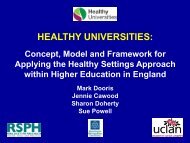Mental health of students in higher education
Mental health of students in higher education - Royal College of ...
Mental health of students in higher education - Royal College of ...
- No tags were found...
Create successful ePaper yourself
Turn your PDF publications into a flip-book with our unique Google optimized e-Paper software.
College Report CR166consultation to staff concerned about <strong>students</strong>tra<strong>in</strong><strong>in</strong>g (<strong>in</strong>clud<strong>in</strong>g suicide awareness) for <strong>students</strong> and staffworkshops for <strong>students</strong> and staffwritten materials to guide <strong>students</strong> and staff <strong>in</strong> their response to<strong>students</strong> <strong>in</strong> distressonl<strong>in</strong>e <strong>in</strong>formation about how to help with study and mental <strong>health</strong>difficultiescollaboration with others with responsibility for mental well-be<strong>in</strong>gwith<strong>in</strong> their own organisationscontributions to <strong>in</strong>stitutional policy-mak<strong>in</strong>g on mental <strong>health</strong> mattersliaison with local NHS providers.Many make considerable use <strong>of</strong> the opportunities afforded bye-technology by, for example, establish<strong>in</strong>g onl<strong>in</strong>e discussion boards orprovid<strong>in</strong>g onl<strong>in</strong>e multimedia programmes such as CALM (Campaign Aga<strong>in</strong>stLiv<strong>in</strong>g Miserably, www.thecalmzone.net). Services rout<strong>in</strong>ely evaluate theeffectiveness <strong>of</strong> their counsell<strong>in</strong>g; many use the Cl<strong>in</strong>ical Outcome <strong>in</strong> Rout<strong>in</strong>eEvaluation (CORE) scale to track changes <strong>in</strong> clients dur<strong>in</strong>g the course <strong>of</strong>counsell<strong>in</strong>g.Cl<strong>in</strong>ical workMost counsell<strong>in</strong>g is <strong>of</strong> <strong>in</strong>dividuals, although many services <strong>of</strong>fer groupcounsell<strong>in</strong>g as well. Many services see staff as well as <strong>students</strong>. The mostcommon issues <strong>students</strong> br<strong>in</strong>g to counsellors are depression, anxiety,problems <strong>in</strong> relationships, loss and worries about their academic progress(data from AUCC annual surveys, see www.aucc.uk.com/survey.php).Many <strong>of</strong> these concerns are similar to those <strong>of</strong> the general population;what is different is the way these difficulties can be triggered by academicrequirements and can <strong>in</strong>terfere with the ability to study. Counsellors attendto the pressures on their clients caused by the demands <strong>of</strong> the student roleand the impact <strong>of</strong> the <strong>education</strong>al cycle. They are aware <strong>of</strong> the therapeuticpossibilities <strong>of</strong> harness<strong>in</strong>g work on the issues thrown up by the <strong>education</strong>alcontext <strong>in</strong> order to promote development and maturation.A range <strong>of</strong> <strong>in</strong>terventions are <strong>of</strong>fered. An <strong>in</strong>itial consultation will usually<strong>in</strong>clude risk assessment. Short-term work, perhaps <strong>in</strong> the form <strong>of</strong> brieffocal therapy, can help to deal with a personal crisis, adverse life event orcurrent conflict. Longer-term therapeutic work can focus on exploration <strong>of</strong>more complex developmental issues, and deeper-seated and long-stand<strong>in</strong>gemotional, psychological and mental <strong>health</strong> problems. Whereas a number<strong>of</strong> services have staff appropriately tra<strong>in</strong>ed and experienced to <strong>of</strong>ferlonger-term, specialised help, few have the resources to <strong>of</strong>fer open-endedpsychotherapy to all <strong>students</strong> who might benefit.The model <strong>of</strong> counsell<strong>in</strong>g <strong>of</strong>fered by <strong>higher</strong> <strong>education</strong> services followsthe paradigm described by the Department <strong>of</strong> Health.‘Counsell<strong>in</strong>g is a systematic process which gives <strong>in</strong>dividuals theopportunity to explore, discover and clarify ways <strong>of</strong> liv<strong>in</strong>g moreresourcefully, with a greater sense <strong>of</strong> well be<strong>in</strong>g. [It] may be concernedwith address<strong>in</strong>g and resolv<strong>in</strong>g specific problems, mak<strong>in</strong>g decisions,cop<strong>in</strong>g with crises, work<strong>in</strong>g through conflict, or improv<strong>in</strong>g relationshipswith others.’ (Department <strong>of</strong> Health, 2001, p. 9)42 http://www.rcpsych.ac.uk





